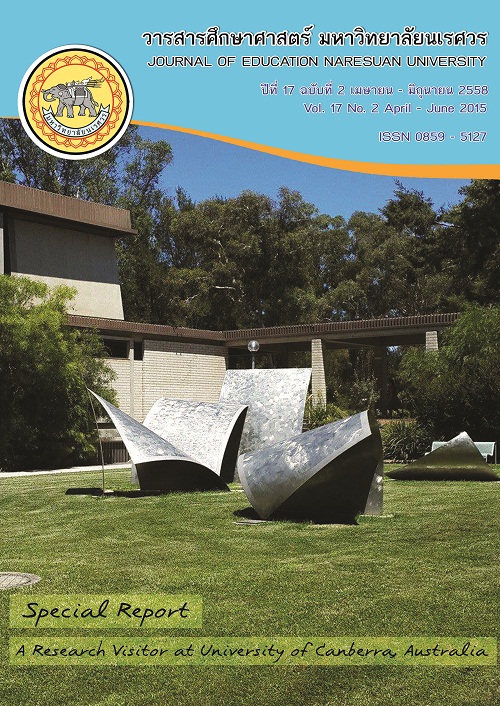รูปแบบการพัฒนาโรงเรียนเอกชนสู่ความเป็นองค์การแห่งนวัตกรรม
Main Article Content
บทคัดย่อ
บทคัดย่อ
การวิจัยนี้ มุ่งนำเสนอรูปแบบการพัฒนาโรงเรียนเอกชนสู่ความเป็นองค์การแห่งนวัตกรรม มีวัตถุประสงค์เฉพาะ 3 ประการ คือ 1) เพื่อหาตัวแปรที่เป็นองค์ประกอบสำคัญของการพัฒนาโรงเรียนเอกชนสู่ความเป็นองค์การแห่งนวัตกรรม 2) เพื่อร่างและตรวจสอบความเหมาะสมของรูปแบบการพัฒนาโรงเรียนเอกชนสู่ความเป็นองค์การแห่งนวัตกรรม และ 3) เพื่อประเมินความเป็นไปได้ในการนำรูปแบบการพัฒนาโรงเรียนเอกชนสู่ความเป็นองค์การแห่งนวัตกรรมไปใช้ การวิจัยครั้งนี้ ใช้ระเบียบวิธีวิจัยแบบผสม 3 ขั้นตอน ขั้นตอนที่ 1 และ 2 เป็นการวิจัยเชิงคุณภาพ ส่วนขั้นตอนที่ 3 เป็นการวิจัยเชิงปริมาณ ในขั้นตอนที่ 1 ได้สังเคราะห์เอกสาร งานวิจัย วิเคราะห์ข้อมูลโดยการวิเคราะห์ สังเกตสภาพทั่วไปของโรงเรียนที่มีปฏิบัติการเป็นเลิศ 5 โรงเรียน และสัมภาษณ์ผู้บริหารสถานศึกษา และครูวิชาการในโรงเรียนเหล่านี้ รวม 10 คน ตามด้วยการสัมภาษณ์ผู้ทรงคุณวุฒิทางการบริหารการศึกษา จำนวน 5 คน ใช้แบบสัมภาษณ์ชนิดมีโครงสร้าง วิเคราะห์ข้อมูลโดยการวิเคราะห์เนื้อหา ขั้นตอนที่ 2 ร่างรูปแบบการพัฒนาโรงเรียนเอกชนสู่ความเป็นองค์การแห่งนวัตกรรม โดยใช้กรอบแนวคิดทฤษฎีการบริหารเชิงระบบ ประกอบกับข้อมูลที่ได้จากการสัมภาษณ์และสังเกตในขั้นตอนที่ 1 แล้ว ตรวจสอบความเหมาะสมของรูปแบบโดยผู้ทรงคุณวุฒิ จำนวน 9 คน ด้วยเทคนิคการสนทนากลุ่ม ตามประเด็นการสนทนาที่ผู้วิจัยกำหนดไว้ และขั้นตอนที่ 3 ประเมินความเป็นไปได้ในการนำรูปแบบการพัฒนาโรงเรียนเอกชนสู่ความเป็นองค์การแห่งนวัตกรรมไปใช้ โดยใช้แบบสอบถามที่ผู้วิจัยสร้างขึ้น กลุ่มผู้ให้ข้อมูล ได้แก่ ผู้รับใบอนุญาต ผู้อำนวยโรงเรียน รองผู้อำนวยการโรงเรียนฝ่ายวิชาการ และครูในโรงเรียนเอกชนประเภทสามัญ จำนวน 345 คน วิเคราะห์ข้อมูลโดยสถิติพื้นฐาน ได้แก่ ค่าเฉลี่ย และส่วนเบี่ยงเบนมาตรฐาน
ผลการวิจัยพบว่า
1. ตัวแปรซึ่งเป็นองค์ประกอบสำคัญของการพัฒนาโรงเรียนเอกชนสู่ความเป็นองค์การแห่งนวัตกรรม ตามความคิดเห็นของผู้ทรงคุณวุฒิ ผู้บริหาร และครูวิชาการของโรงเรียนเอกชนที่มีความเป็นเลิศ แบ่งออกเป็น 7 องค์ประกอบ ที่สัมพันธ์กัน ได้แก่ 1) การจัดโครงสร้างแบบยืดหยุ่น 2) การสร้างกลยุทธ์เชิงนวัตกรรม 3) การจัดระบบเทคโนโลยีสารสนเทศเพื่อการสื่อสารที่เอื้อต่อการสร้างนวัตกรรม 4) การสร้างวัฒนธรรมองค์การและบรรยากาศที่เอื้อต่อการสร้างนวัตกรรม 5) ภาวะผู้นำเชิงนวัตกรรมของผู้บริหารสถานศึกษา 6) การสร้างทีมงานเฉพาะกิจ และ 7) เครือข่ายความร่วมมือที่หลากหลาย
2. รูปแบบที่เหมาะสมสำหรับการพัฒนาโรงเรียนเอกชนสู่ความเป็นองค์การแห่งนวัตกรรม ตามความคิดเห็นของผู้ทรงคุณวุฒิกลุ่มที่สอง คือ รูปแบบการบริหารเชิงระบบ ซึ่งมี 8 องค์ประกอบ แบ่งออกเป็นด้านปัจจัย 4 องค์ประกอบ ด้านกระบวนการ 2 องค์ประกอบ และด้านสิ่งแวดล้อม 2 องค์ประกอบ ด้านปัจจัย ได้แก่ 1) โครงสร้างองค์การแบบยืดหยุ่น เอื้อต่อการสร้างนวัตกรรม 2) ภาวะผู้นำเชิงนวัตกรรมของผู้บริหารสถานศึกษา 3) ระบบเทคโนโลยีสารสนเทศเพื่อการสื่อสารที่เอื้อต่อการสร้างนวัตกรรม 4) เครือข่ายความร่วมมือที่หลากหลาย ด้านกระบวนการ ได้แก่ 1) การสร้างกลยุทธ์เชิงนวัตกรรม และ 2) การสร้างทีมงานเฉพาะกิจที่เอื้อต่อการสร้างนวัตกรรม ด้านสิ่งแวดล้อมขององค์การ ได้แก่ 1) วัฒนธรรมองค์การที่เอื้อต่อการสร้างนวัตกรรม และ 2) บรรยากาศองค์การที่เอื้อต่อการสร้างนวัตกรรม
3. การประเมินความเป็นไปได้ของการนำรูปแบบการพัฒนาโรงเรียนเอกชนสู่ความเป็นองค์การแห่งนวัตกรรมไปใช้ พบว่า มีความเป็นไปได้อยู่ในระดับมาก
คำสำคัญ: รูปแบบการพัฒนาโรงเรียนเอกชน/ องค์การแห่งนวัตกรรม
Abstract
This research aimed to propose a model for the development of a private school towards an innovative organization. The specific objectives were three-folds: 1) to identify the significant elements for the development of a private school towards an innovative organization; to draft and verify the propriety of the model; and 3) to confirm the applicability of the model. The research methodology relied on a mixed method, based on three stages. Qualitative approaches were employed in the first and second stages, while a quantitative approach was used in the third stage. In the first stage, five schools of the Best Practices were selected and observed. Then, the principals and head teachers in these schools were interviewed, followed by the interviews of five experts in educational administration, using a constructed interviewing technique. The collected data were analyzed through content analysis. In the second stage, the analyzed data from the first staged and the framework of systems theory of administration were used for the drafting of a model for the development of a private school towards an innovative organization. The propriety of the drafted model was verified by 9 educational experts who attended a face-to-face focus group seminar. In the third stage, the applicability of the proposed model was tested, using a questionnaire delivered to 345 persons who were systematically sampled from private school legal grantee, directors, school vice directors, and head teachers. The basic statistics for data analysis were mean and standards deviation.
The research findings:
1. Seven elements were viewed by principals and head teachers of selected private schools for Best Practices and the selected experts in educational administration as necessary to the development of a private school towards an innovative organization. They were: 1) flexible organization structure; 2) innovative strategies; 3) appropriate information technology and communication system; 4) appropriate organization culture and organization climate; 5) innovative leadership of the school principal; 6) ad hoc teams for innovative missions; and 7) a wide range of networks.
2. The appropriate model for the development of a private school towards an innovative organization as proposed by the second groups of educational experts was a systems approach model comprising eight elements. The first four elements were the inputs of the administrative system, while two other elements were important processes, and the other two were important environments. The inputs were: 1) flexible organization structure; 2) innovative leadership of the school principal; 3) appropriate ICT system; and 4) a wide range of networks. The important processes were: 1) innovative strategy formulation process; and 2) innovative ad hoc team-building process. The important environments were: 1) innovative organization culture; and 2) innovative organization climate.
3. The applicability of the proposed model for the development of a private school towards an innovative organization was evaluated as highly applicable.
Key words: Model for Development of Private School/ Innovative Organization
Article Details
เจ้าของบทความมิได้คัดลอก หรือละเมิดลิขสิทธิ์ของผู้ใด หากเกิดการละเมิดลิขสิทธิ์ ไม่ว่าวิธีใด หรือการฟ้องร้องไม่ว่ากรณีใด ๆ ที่อาจเกิดขึ้นได้ กองบรรณาธิการวารสารศึกษาศาสตร์ ไม่มีส่วนเกี่ยวข้องทั้งสิ้น ให้เป็นสิทธิ์ของเจ้าของบทความที่จะดำเนินการ


